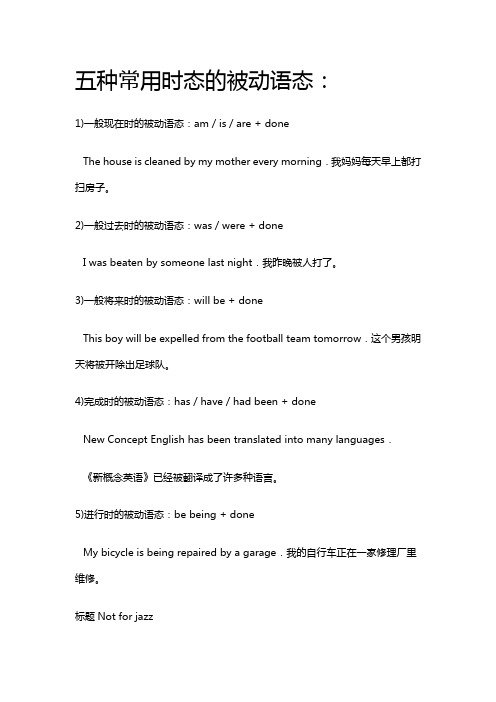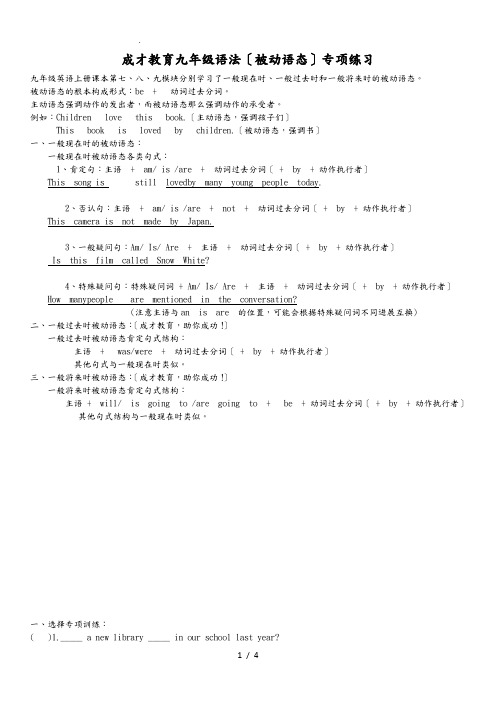一般现在时间,一般过去时被动语态
- 格式:doc
- 大小:29.00 KB
- 文档页数:3

时态的公式
1.一般过去时:did
2.一般将来时:will+do/be going to+do
3.一般现在时:do/does
4.现在进行时;be+doing
5.现在完成时:have/has+done
6.现在完成进行时:have/has+been+doing
7.过去进行时:was/were+doing
8.过去完成时:had+done
9.过去完成进行时:had been+doing
10.将来进行时:will+be+doing
11.将来完成时:will+have+done
12.将来完成进行:will+have+been+doing
13.一般过去将来时:would+do或者was/were+going to+do
14.过去将来进行时:would+be+doing
15.过去将来完成时:would+have+done
16.过去将来完成进行时:would+have+been+doing
被动语态
1)一般现在时:am/is/are+done
2)一般过去时:was/were+done
3)一般将来时:will+be+done
4)过去将来时:would+be+done
5)现在进行时:am/is/are+being+done
6)过去进行时:was/were+being+done
7)将来进行式:will+be+being+done
8)现在完成时:have+has+been+done
9)过去完成时:had+been+done
10)将来完成时:will+have+been+done。


五种常用时态的被动语态:1)一般现在时的被动语态:am/is/are + doneThe house is cleaned by my mother every morning.我妈妈每天早上都打扫房子。
2)一般过去时的被动语态:was/were + doneI was beaten by someone last night.我昨晚被人打了。
3)一般将来时的被动语态:will be + doneThis boy will be expelled from the football team tomorrow.这个男孩明天将被开除出足球队。
4)完成时的被动语态:has/have/had been + doneNew Concept English has been translated into many languages.《新概念英语》已经被翻译成了许多种语言。
5)进行时的被动语态:be being + doneMy bicycle is being repaired by a garage.我的自行车正在一家修理厂里维修。
标题Not for jazz总结for的用法:1)为:I bought a book for you.我为你买了一本书。
2)因为:Something fell in,for I heard a splash.一定有东西掉下去了,因为我听见扑通一声。
4)适合:Not for jazz=It's not suitable to play jazz on the clavichord.古钢琴不适合演奏爵士乐。
Question:What happened to the clavichord?to后面加宾语,表示其身上发生了什么事,即动作的目标、对象。
What happened to you?你怎么了?(在你身上发生了什么事?)(1)否定句与疑问句的被动语态We don’t believe her.我们不信她的话。

一般现在时和一般过去时的被动语态仿写句子一般现在时,为表示人或物已经离开自己的时间而采用的主动语态。
当主语不存在时,被动语态是一般现在时,表示所处时期。
如:这是一种非常熟悉的语言形态。
当主语不存在时,被动语态指由于客观原因而暂时失去语言意义的状态。
如:在这次期末考试中,学校的教学改革活动取得了显著成效。
对大多数学生来说,既重视老师讲得精讲课细,也重视同学们在课堂上积极主动地参与知识和技能的训练。
而对于学习英语来说尤其如此。
1.这个星期天是星期五。
这周我要去学习,他不在。
你不知道吗?他现在去了大学,我得带他去参加体育活动。
如果你想参加体育运动,你必须坚持在星期六下午6点之前到达学校。
不能提前到达学校,因为,由于交通原因,不能提前到达学校。
我在周一下午4点15分以前到达学校。
所以,没有任何准备。
】从上午9点到下午5点这段时间里,同学们都在努力学习。
他们在课堂上积极主动地参与知识和技能练习以提高自己、完善自己并迎接挑战。
学习态度十分认真。
2.今天你必须要参加一个小型英语学习小组。
我想你肯定想在这个小组里学习英语。
你们是一个小组,你们有许多共同的话题,比如你在学校里应该如何运用英语进行交流等。
当主语不存在时,一般过去时动词采用的是主动语态。
如:我必须要参加一个小型英语学习小组。
你应该非常了解自己的情况。
我每天都要坚持练习,把我从初中以来学到的知识应用到我的生活中去。
如:通过每天坚持练习英语,你在高中学习英语时将会学到很多东西。
只要你坚持每天进行练习就一定能提高自身各方面素质。
3.这是我们新学期第一次,在这样一个紧张的学期里,我要认真地学习,认真地对待。
我要认真地做好,认真地对待每一件事。
这次考试一定会考得很好,所以我要拿出最好的成绩,报答老师。
当人们都为一道题争论不休时,为什么我也要去?因为我是一名英语教师,所以我要尽最大努力向我的学生传授好的教师技能和教学经验。
我要努力做到最好。
我非常欣赏教师,因为我很敬佩他为学生服务的精神。

被动语态一.被动语态的意义:表示主语是动作的承受者,什么事情被主语做。
二.被动语态的结构: "助动词be+及物动词的过去分词",助动词必须与主语的人称和数一致,同时要体现主动句的时态特征。
常用时态主动语态与被动语态结构对照如下:①一般现在时:主动句do/does 被动句am / is are+done②一般过去时:主动句did 被动句was / were+done③一般将来时:主动句will do 被动句will be+done④现在进行时:主动句am/ is are+doing 被动句am / is are+being+done⑤过去进行时:主动句was/ were+doing 被动句was/ were+being+done⑥现在完成时; 主动句have/ has +done 被动句have/ has+been+done三.适合被动语态的情况:①不知道动作由谁发出,或没有必要说明。
如:This table is made of wood.②需要突出或强调动作的承受者时。
如:This park was built for children.注意:主动句里,不定式在make,see,hear等动词后面作宾语补足语时都不带to,但变成被动句时,后面的不定式都需带to。
如:The boss made him do that work.=He was made to do that work.四.主动语态不能变被动语态的情况:①当宾语是反身代词时, 如:You should take care of yourself.②当谓语是表状态的而不是表具体动作的及物动词时,如:Does the skirt suit you?③happen,appear等词只用于主动语态。
练习:1. The stars _______ in the daytime.A. can't seeB. can't be seenC. can't been seeD. see2. A present _______ to me by Mother next week.A. will giveB. is givenC. will be giveD. will be given3. The Communist Party of China _______ in Shanghai in 1921.A. was foundB. foundC. was foundedD. founded4. Great changes _______ in my hometown since liberation.A. have been taken placeB. took placeC. have taken placeD. were taken place5. I was astonished (吃惊) to hear that the colour TV set _______ 5,000 yuan.A. has costB. costC. costedD. was cost6. He was seen _________ something from the shop.A. steelB. to stealC. to be stolenD. stealed7. She has _________ by her classmates.A. laughedB. laughed atC. been laughedD. been laughed at8. The computer ________ in the room.A. can useB. can be useC. can be usedD. can used9. That clock ______ Big Ben.A. callB. callingC. is calledD. calls10. The film _______ again sometimes next week.A. showsB. will showsC. will be shownD. shows。

成才教育九年级语法〔被动语态〕专项练习九年级英语上册课本第七、八、九模块分别学习了一般现在时、一般过去时和一般将来时的被动语态。
被动语态的根本构成形式:be + 动词过去分词。
主动语态强调动作的发出者,而被动语态那么强调动作的承受者。
例如:Children love this book.〔主动语态,强调孩子们〕This book is loved by children.〔被动语态,强调书〕一、一般现在时的被动语态:一般现在时被动语态各类句式:1、肯定句:主语 + am/ is /are + 动词过去分词〔 + by + 动作执行者〕This song is still lovedby many young people today.2、否认句:主语 + am/ is /are + not + 动词过去分词〔 + by + 动作执行者〕This camera is not made by Japan.3、一般疑问句:Am/ Is/ Are + 主语 + 动词过去分词〔 + by + 动作执行者〕Is this film called Snow White?4、特殊疑问句:特殊疑问词 + Am/ Is/ Are + 主语 + 动词过去分词〔 + by + 动作执行者〕How manypeople are mentioned in the conversation?(注意主语与an is are 的位置,可能会根据特殊疑问词不同进展互换)二、一般过去时被动语态:〔成才教育,助你成功!〕一般过去时被动语态肯定句式结构:主语 + was/were + 动词过去分词〔 + by + 动作执行者〕其他句式与一般现在时类似。
三、一般将来时被动语态:〔成才教育,助你成功!〕一般将来时被动语态肯定句式结构:主语 + will/ is going to /are going to + be + 动词过去分词〔 + by + 动作执行者〕其他句式结构与一般现在时类似。
成才教育九年级语法被动语态专项练习九年级英语上册课本第七、八、九模块分别学习了一般现在时、一般过去时和一般将来时的被动语态;被动语态的基本构成形式:be + 动词过去分词;主动语态强调动作的发出者,而被动语态则强调动作的承受者;例如:Children love this book.主动语态,强调孩子们This book is loved by children.被动语态,强调书一、一般现在时的被动语态:一般现在时被动语态各类句式:1、肯定句:主语+ am/ is /are + 动词过去分词+ by + 动作执行者This song is still loved by many young people today.2、否定句:主语+ am/ is /are + not + 动词过去分词+ by + 动作执行者This camera is not made by Japan.3、一般疑问句:Am/ Is/ Are + 主语+ 动词过去分词+ by + 动作执行者Is this film called Snow White4、特殊疑问句:特殊疑问词+ Am/ Is/ Are + 主语+ 动词过去分词+ by + 动作执行者How many people are mentioned in the conversation注意主语与an is are 的位置,可能会根据特殊疑问词不同进行互换二、一般过去时被动语态:成才教育,助你成功一般过去时被动语态肯定句式结构:主语+ was/were + 动词过去分词+ by + 动作执行者其他句式与一般现在时类似;三、一般将来时被动语态:成才教育,助你成功一般将来时被动语态肯定句式结构:主语+ will/ is going to /are going to + be + 动词过去分词+ by + 动作执行者其他句式结构与一般现在时类似;一、选择专项训练:anewlibrary_____inourschoollastyearA.Is;builtB.Was;builtC.Does;buildD.Didbuild2.Anaccident____onthisroadlastweek.A.hasbeenhappenedB.washappenedC.ishappenedD.happened棉花____inthesoutheastofChina.A.isgrownB.aregrownC.growsD.growfar,themoon____bymanalready.visitedB.willbevisitedC.hasbeenvisitedD.wasvisitedtalkonChinesehistory_____intheschoolhallnextweek.A.isgivenB.hasbeengivenC.willbegivenD.givesmanytrees____thisyearA.areplantedB.willplantC.havebeenplantedD.plantedlotofthings____bypeopletosavethelittlegirlnow.A.aredoingB.arebeingdoneC.hasbeendoneD.willbedone___thiskindofcomputers______--Lastyear.A.did;useB.was;usedC.is;usedD.are;usedGreatWall____allovertheworld.A.knowsB.knewC.isknownD.wasknown_____thisbook_____A.did;writtenB.was;writtenbyC.did;writtenD.was;writtenstory_____byGrannyyesterday.A.wastoldusB.wastoldtousC.istoldusD.toldus monkeywasseen_____offthetree.A.jumpB.jumpsC.jumpedD.tojumpschoolbag___behindthechair.A.putsB.canbeputC.canbeputtedD.canputpeople____well.A.looksafterB.mustbelookedafterC.mustlookafterD.lookedafterteacher______carefully.A.shouldbelistenedtoB.shouldbelistenC.belistenedD.islistened1.Rubbish_______intotheriverinordertoprotecttheenvironment.A.mustthrowB.mustn’tbethrownC.can’tbethrownD.maybethrown2.Afterthelights________,welefttheclassroom.A.turnedoffB.isturnedoffC.wereturnedD.wereturnedoff3.Whentheaccident_________,weweregoingbythehospital.A.takeplaceB.weretakenplaceC.werehappenedD.happened4.Aknife_______cutthings,likeapples,watermelons.A.isusedtoB.isusedforedtoeto5.MrZhang_______eatingShandongfoodnow.A.wasusedB.isusedtoedtoD.willbeusedfor6.JustnowTomwasseen______withJames.A.tofight.B.fightingC.fightD.fought.7.Thebrokenchairsneed_______atonce.A.repairedB.toberepairedC.beingrepairedD.repair8.______myTV_______hereA.Can,berepairedB.Is,canrepairedC.Can,repairedD.Can,repair9.When_____thebridge______A.did,buildB.was,builtC.did,setD.was,build10._____manypollutedthings_______outofthecityyetA.Are,beingmovedB.Have,beenmovedC.Have,movedD.Did,move11._____thefloor______bythestudentsondutyatthemomentA.Are,cleanedB.Is,sweptB.C.Is,beingsweptD.Does,sweep1. Oneortwoman-madesatellites______inourcountryeveryyear.A.havebeensentupB.willbesentupC.issentupD.aresentup2. OurTVset_____yesterday.A.isrepairedB.wasrepairedC.hadbeenrepairedD.wouldberepaired3. Anewbuilding_____inourschoolnextyear.A.willbebuiltB.isbuiltC.isbeingbuiltD.hasbeenbuilt4. Manybooksonscience_____sinceIwenttocollege.A.wereboughtB.havebeenboughtC,willbeboughtD.arebought5. AwonderfulEnglishtalk_____byMrLiutomorrow.A.hasbeengivenB.isgivenC.isbeinggivenD.willbegiven6. How_____theGreatPyramid金字塔____manyyearsagowithoutmodernmachines.A.is…builtB.would…bebuiltC.have…beenbuiltD.was…built7. Foodandclothes____bywomen.AisoftentalkaboutB.areoftentalkedC.areoftentalkedaboutD.oftentalkedabout8. _____thework_____yetA.is…finishedB.Will…befinishedC.Has…beenfinishedD.Would…befinished9. Suchfilms_____bychildrenlikeyou.A.mustbenotseenB.mustnotbeseeC.mustnotseenD.mustnotbeseen10. Trees_____inwinterbutinspringA.notcanbeplantedB.canbenotplantedC.can’tbeplantedD.cannotbeplant11. Thiskindofcars____inJapantenyearsago.A.canonlybemadeB.couldonlymadeC.becouldonlymadeD.couldonlybemade12. Jackoftendoesthingsfoolishly,sohe____sometimes_____byothers.A.is…laughedB.is…laughedatC.was…laughedD.has…beenlaughedat13. Thebear______tothezootomorrowmorning.A.maybesendB.mayissentC.maybesentD.ismaysent14. Inthepasttenyear,alotofnewbuildings_____inourcity.A.areputupB.haveputupC.havebeenputD.havebeenputup15. Suchfilms_____bychildrenlikeyou.A.mustbenotseenB.mustnotbeseeC.mustnotseenD.mustnotbeseen二、用所给动词的正确时态和语态填空;1. Sometopstudents___ __sendtostudyinforeigncountriesonceayear.2.Moreandmoreschools___________buildherelater.3.WherearetheapplesIthinkthey____ ___eatbythoseboys.4.Manynewthings__________inventinthelasttenyears.5.Alltheshoes__________selloutlastweek.6.Howlong_______thebook_________cankeep7.Tom_______hidehisshoesbehindthetree.Sothey_________notfindeasily.8.Thebabieshere_________takegoodcareofeveryday.9.We______opentheboxandtwonewcoats______seeinit.10.Hisnewnovel_______finishnextweek.。
初中常考词汇举例的被动语态句子,分为一般现在时、一般过去时、一般将来时、现在进行时和过去进行时五种时态:1.一般现在时:•English is taught in most schools around the world. → 英语在全世界大多数学校都有教学。
•Cars are driven on the right side of the road in the United States. → 在美国,车辆在马路的右侧行驶。
•The sun is shining brightly this morning. → 今天早晨,太阳在灿烂地照耀着。
•Coffee is served at breakfast time. → 在早餐时间提供咖啡。
•Many homes are heated with central air conditioning. → 许多家庭使用中央空调供暖。
1.一般过去时:•The house was built in 1980. → 这所房子在1980年建成。
•They were all tired after the long day at the office. → 在办公室度过了漫长的一天后,他们都感到疲惫。
•The homework was finished last night. → 家庭作业是昨晚完成的。
•The classrooms were decorated for the holidays. → 教室为假期进行了装饰。
•The email was sent before 5 PM. → 那封邮件在下午5点前发送了。
1.一般将来时:•The movie will be released next month. → 这部电影将在下个月上映。
•They will vi sit their grandparents next week. → 他们将在下周拜访他们的祖父母。
七种被动语态形式1) 一般现在时的被动语态 (am/is/are+ 过去分词)如: The work is done during two days.2) 一般过去时的被动语态 (was/were+ 过去分词)如: He was sent to the hospital immediately after the accident.3) 一般将来时的被动语态 (will/shall + be + 过去分词或 + be going to + be + 过去分词)如: The work will be finished soon.4) 现在进行时的被动语态 (is/am/are + being+ 过去分词)如: The bridge is now being constructed.5) 现在完成时的被动语态 (have/has +been + 过去分词)如: The radio has been repaired when we phoned the shop.6) 带情态动词的被动语态 (情态动词 + be + 过去分词)如: This can be done in a few minutes.7) 动词不定式的被动式 (to be + 过去分词)如: It is an honor for me to be asked to speak here.现在完成时的被动语态其构成是: have/has been + done现在完成时的被动语态表示动作发生在过去, 到现在已经完成或对现在仍有影响,。
如:1. The dirty clothes have been washed.脏衣服都已经洗了。
2. The plan has been studied by the experts for three times.这项计划已经由专家研究过三次了。
现在完成时:表示从过去持续到现在,还可能继续持续下去的动作,往往和表示一段时间的状语(for+一段时间, since…, )等连用,或用于how long 句型中1. 主语是行为动作的承受者。
语态是动词的一种形式,表示句子中主语和谓语动词的关系,主动语态表示主语是动作的执行者,被动语态表示主语是动作的承受者。
只有及物动词才能用于被动语态。
一.被动语态的时态:1.一般现在时的被动语态:am /is/ are +动词的过去分词2.一般过去时的被动语态:was /were +动词的过去分词3.一般将来时的被动语态:will be +动词的过去分词4.现在进行时的被动语态:am /is /are +being +动词的过去分词5.现在完成时的被动语态:have /has +been +动词的过去分词6.情态动词的被动语态:情态动词+ be +动词的过去分词二.被动语态的基本用法:(1) 需要强调动作的承受者时The Great Wall is enjoyed by millions of people all over the worldEnglish is widely spoken in the world now.(2) 不知道或没必要指出动作的执行者时Mr. Wang is invited to the meeting today .The problem is dealt with now .(3) 当说话人需要强调客观时It is said that she was a beauty when she was young .三.主动主动语态变被动语态的变法:口诀:宾变主,主变宾,谓变be done ,时不变,数格必须随被变。
注:1.主动、被动的时态要一致。
2.主动、被动的句式要一致。
3.变成的被动语态的主语与谓语在单复数上保持一致。
语态转换不被动语态的步骤1, 把原主动句中的宾语转换为被动语态的主语2, 把动词改为被动语态形式即"be+过去分词"。
3, 原来主动语态句子中的主语,如果需要就放在by的后面以它的宾格形式出现(因为by是介词,后面需跟宾格作介词的宾语。
一般现在时被动语态专练(一)
结构式:a.肯定句:主语+ am / is / are +动词的过去分词+(by+人代宾格 )+其他
eg .English is studied (by us ) every day.
b.否定句::主语+ am / is / are + not +动词的过去分词+(by+
人代宾格 )+其他
eg. English is not studied (by us ) every day.
c.疑问句:Is English not studied (by us ) every day.?
d.特殊疑问句:What/Where/When+ am / is / are +主语+动词的
过去分词+其他?
一.把主动语态变成被动语态。
1.He cleans the room every Sunday.
2.Farmers grow rice in the south .
3.People in England speak English
4.We play football on the playground every afternoon.
5.Do you often watch TV at home in the evening ?
6.She doesn’t finish her homework
7.They don’t read that book.
8.Where do they watch basketball match every week?
9.What does Tom study?
10.W hen do you listen to music?
二.把被动语态变成主动语态。
1.keys are used for locking .(we)
2.Football is played .(the students)
3.Desks are made of wood .(workers)
4.Chinese isn’t had in the classroom.(the teacher)
5.Is this book read every day?
6.Where are bikes made (they)?
7.What is done ?(Lucy)
8.Are the pens made in the factory?(you )
9.English isn’t sp oken by people in China.
10.W e are given some money (they).
一般过去时被动语态专练(二)
结构式:
a.肯定句:主语+ was /were+动词的过去分词+(by+人代宾格 )+其
他
eg .English was studied (by us ) every day.
b.否定句:主语+ was /were+not +动词的过去分词+(by+人代宾格 )+其他
eg. English was not studied (by us ) every day.
c.疑问句:Was English not studied (by us ) every day.?
d.特殊疑问句:What/Where/When+was /were +主语+动词的过去分词
+其他?
一.把主动语态变成被动语态
1.We built this library last year.
2.I watched TV yesterday evning.
3.He passed me a book .
4.She heard me sing in the next room .
5.They didn’t finish his homework yesterday
6.Did you play football on the playground yesterday?
7.Where did you fly a kite ?
8.When did they read this book?
9.What did you use it for ?
10.H e asked me not to go there.
二.被动语态变成主动语态。
1.The baby was looked after by his mother .
2.Was he given any bananas?( I )
3.Where were these bikes made by workers ?
4.Basketball wasn’t played on the playground .( the students )
5.Iwas heard to sing in the next room .(Tom)
6.That tall building was built three years ago.(workers)
7.Were your homework finished yesterday ?
8.Planes weren’t made in the factory.(加主语)
9.When were those machines produced?(we)
10.The teachers weren’t listened to by the students .。